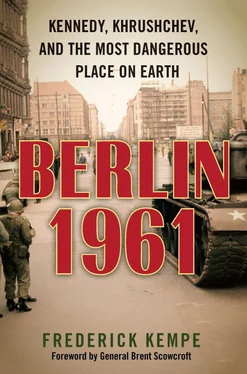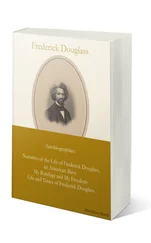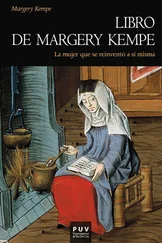With all that as the backdrop, nothing threatened Khrushchev more than the deteriorating situation in divided Berlin. His critics complained that he was allowing the communist world’s most perilous wound to fester. East Berlin was hemorrhaging refugees to the West at an alarming rate. They were a self-selecting population of the country’s most motivated and capable industrialists, intellectuals, farmers, doctors, and teachers. Khrushchev was fond of calling Berlin the testicles of the West, a tender place where he could squeeze when he wanted to make the U.S. wince. However, a more accurate metaphor was that it had become his and the Soviet bloc’s Achilles’ heel, the place where communism lay most vulnerable.
Yet Khrushchev betrayed none of those concerns as he worked a New Year’s crowd that included cosmonauts, ballerinas, artists, apparatchiks, and ambassadors, all bathed in the light of the hall’s six massive bronze chandeliers and three thousand electric lamps. For them, an invitation to the Soviet leader’s party was itself confirmation of status. However, they buzzed with even greater than usual anticipation, for John F. Kennedy would take office in less than three weeks. They knew the Soviet leader’s traditional New Year’s toast would set the tone for U.S.–Soviet relations thereafter.
As the Kuranty clock of the sixteenth-century Spasskaya Tower ticked over Red Square toward its thunderous midnight chime, Khrushchev generated his own heat inside St. George’s Hall. He hand-clasped some guests and bear-hugged others, nearly bursting from his baggy gray suit. It was the same energy that had carried him to power from his peasant birth in the Russian village of Kalinovka near the Ukrainian border, through revolution, civil war, Stalin’s paranoid purges, world war, and the leadership battle following Stalin’s death. The communist takeover had provided many Russians of humble beginnings with new opportunities, but none had survived as skillfully nor risen as far as Nikita Sergeyevich Khrushchev.
Given Khrushchev’s increased capability to launch nuclear-tipped missiles at the West, it had become a consuming occupation of U.S. intelligence agencies to fathom Khrushchev’s psychological makeup. In 1960, the CIA had assembled some twenty experts—internists, psychiatrists, and psychologists—to scrutinize the Soviet leader through films, intelligence files, and personal accounts. The group went so far as to inspect photo close-ups of Khrushchev’s arteries to assess rumors of their hardening and his high blood pressure. They concluded in a highly classified report—which later would reach President Kennedy—that despite Khrushchev’s mood swings, depressions, and drinking bouts (which they reported he had recently brought under greater control), the Soviet leader exhibited the consistent behavior of what they called a “chronic optimistic opportunist.” Their conclusion was that he was more of an ebullient activist than, as many had believed until then, a Machiavellian communist in Stalin’s mold.
Another top-secret personality sketch prepared by the CIA for the incoming administration noted Khrushchev’s “resourcefulness, audacity, a good sense of political timing and showmanship, and a touch of the gambler’s instinct.” It warned the newly elected Kennedy that behind the often buffoonish manner of this short, squat man lay a “shrewd native intelligence, an agile mind, drive, ambition and ruthlessness.”
What the CIA didn’t report was that Khrushchev took personal responsibility for Kennedy’s election and was now seeking the payoff. He boasted to comrades that he had cast the deciding vote in one of America’s closest presidential elections ever by refusing Republican entreaties that he release three captured American airmen—the downed U-2 pilot, Francis Gary Powers, and two crew members of an RB-47 reconnaissance plane shot down by the Soviets over the Barents Sea two months later—during the height of the election campaign. Now he was working impatiently through multiple channels to land an early summit meeting with Kennedy in hopes it would solve his Berlin problem.
During the campaign, the Soviet leader’s instructions to his top officials had been clear, regarding both his desire for a Kennedy win and his distaste for Richard Nixon, who as Eisenhower’s anticommunist vice president had humiliated him in Moscow during their so-called Kitchen Debate over the relative advantages of their two systems. “We can also influence the American presidential election!” he had told his comrades then. “We would never give Nixon such a present.”
After the election, Khrushchev had crowed that by refusing to release the airmen he had personally cost Nixon the few hundred thousand votes he would have required for his victory. Just a ten-minute walk from his Kremlin New Year’s party, the American captives languished as a reminder of Khrushchev’s electoral manipulation inside the KGB’s Lubyanka Prison, where the Soviet leader was keeping them as political pawns to be traded at some future moment for some other gain.
As the countdown to his New Year’s toast continued, Khrushchev bathed in the crowd more like a populist politician than a communist dictator. Though still vigorously youthful, he had aged with the accelerated speed of so many other Russians, having already turned gray at age twenty-two after a serious illness. As he bantered with comrades, he often threw back his nearly bald head and exploded in mirth at one of his own stories, unself-consciously showing bad teeth with a center gap and two golden bicuspids. Closely cropped gray hair framed a round, animated face with three large warts, a slit scar under his pug nose, red cheeks with deep laughter lines, and dark, piercing eyes. He waved his hands and spoke short, staccato sentences in a loud, high-pitched, nasal voice.
He recognized many faces and asked after comrades’ children by name: “How is little Tatyana? How is tiny Ivan?”
Given his purpose that evening, Khrushchev was disappointed not to find among the crowd Moscow’s most important American, Ambassador Llewellyn “Tommy” Thompson, with whom he had remained close despite the decline of the U.S.–Soviet relationship. Thompson’s wife, Jane, apologized to Khrushchev that her husband was home nursing ulcers. It was also true that the ambassador was still smarting from his encounter with the Soviet leader at the previous New Year’s gathering, when an inebriated Khrushchev had nearly declared World War III over Berlin.
It had been two in the morning when Khrushchev, in an alcoholic haze, escorted Thompson, his wife, the French ambassador, and Italy’s Communist Party leader into a newly built anteroom of St. George’s Hall, curiously decorated with a running fountain filled with colored plastic rocks. Khrushchev spat at Thompson that he would make the West pay if it didn’t satisfy his demands for a Berlin agreement that would include Allied troop withdrawal. “We have thirty nuclear weapons earmarked for France, more than enough to destroy that country,” he said, tilting his head toward the French ambassador. He added for good measure that he was reserving fifty each for West Germany and Britain.
In an awkward attempt to restore a lighter mood, Jane Thompson had asked how many rockets Khrushchev had earmarked for Uncle Sam.
“That’s a secret,” Khrushchev had said with a wicked smile.
In an attempt to reverse the degenerating tone, Thompson had offered a toast to the upcoming Paris Summit with Eisenhower and its potential for improved relations. The Soviet leader, however, only escalated his threats, discarding his commitment to Eisenhower that he would refrain from any unilateral disruptions over Berlin until after the Paris meeting. Thompson was able to end the vodka-soaked session only at six in the morning, when he walked away knowing superpower relations would depend on Khrushchev’s inability the next morning to recall anything he had said that night.
Читать дальше











